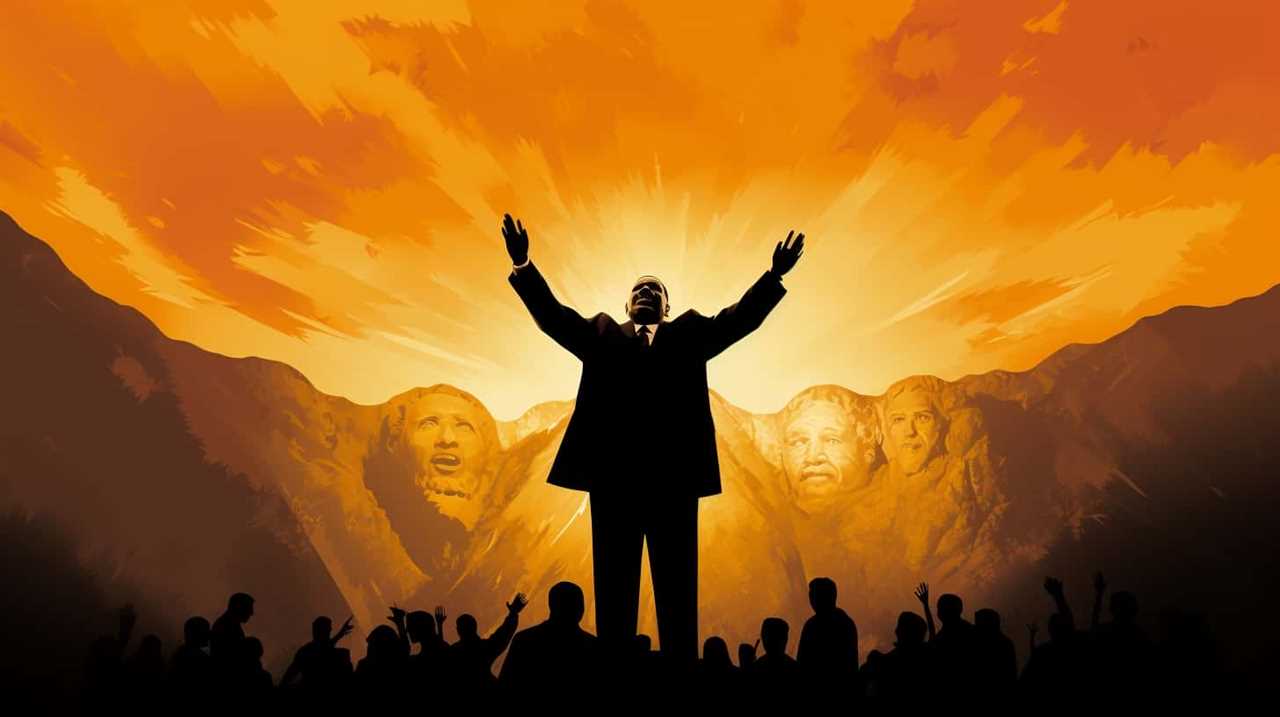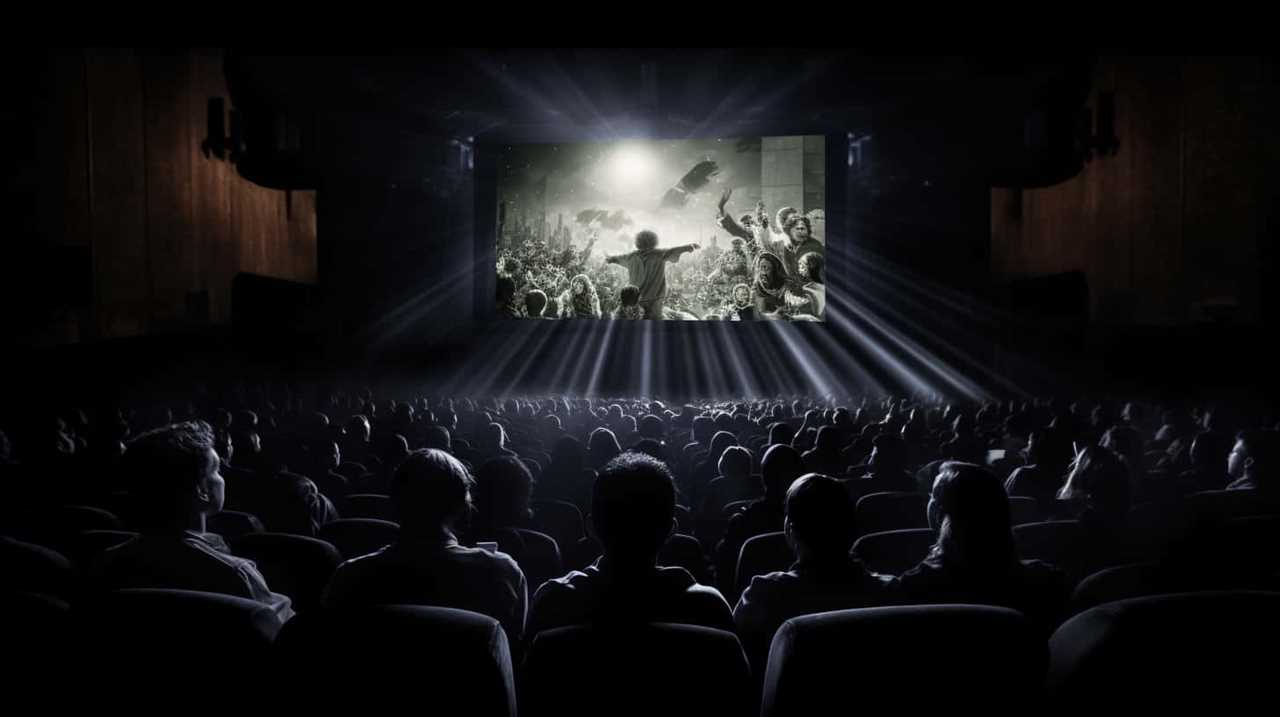As a cinema enthusiast, I have always been captivated by the way film scripts delve into philosophical concepts, much like a diver exploring uncharted depths of the sea. This fascinating process sparks curiosity and ignites creativity in the minds of viewers.
Film scripts have the ability to transcend mere entertainment and serve as a platform for thought-provoking discussions on existential themes, moral dilemmas, and the nature of reality. Through intricate character development and the incorporation of philosophical concepts, these scripts challenge us to question our own beliefs and perceptions.
It is through this marriage of philosophy and cinema that we are able to explore profound ideas and engage in intellectual discourse.
Key Takeaways
- Film scripts explore existential themes and moral dilemmas to provoke introspection and examine the human condition.
- Filmmakers use cinema to challenge societal norms and depict characters who defy traditional moral standards.
- Storytelling techniques in film scripts blur the lines between fantasy and reality, encouraging viewers to question their own perceptions.
- Character development in film scripts incorporates philosophical concepts, adding depth and meaning to the narrative.
Existential Themes in Film Scripts
Existential themes permeate film scripts, provoking introspection and exploring the human condition. In the realm of cinema, the exploration of existential crisis and the complexities of human existence have become increasingly prevalent. Filmmakers have been drawn to these themes because they provide a unique lens through which to examine the fundamental questions of life, purpose, and identity.

An existential crisis, at its core, is a profound and often unsettling moment of self-reflection. It’s a period in which individuals question the meaning and purpose of their lives, grappling with the inherent uncertainty and existential angst that comes with human existence. These themes resonate deeply with audiences, as they tap into universal human experiences and the inherent longing for meaning and understanding.
Through the medium of film, filmmakers are able to depict and explore these existential themes in a visually compelling and emotionally resonant manner. Cinema allows for a heightened sense of introspection and contemplation, as characters navigate the complexities of their own existence and confront the existential dilemmas that arise. This exploration of the human condition invites audiences to reflect on their own lives and contemplate the deeper questions that lie at the heart of our existence.
As we delve further into the exploration of existential themes in film, it becomes clear that these narratives often give way to the examination of moral dilemmas.
Moral Dilemmas Explored in Cinema
How do film scripts explore moral dilemmas in cinema?

Ethical quandaries and conflicts have played a significant role in the history of cinema, providing audiences with thought-provoking narratives that challenge their beliefs and values. Film scripts delve into moral dilemmas by presenting characters who are confronted with difficult choices that often involve ethical considerations. These dilemmas serve as a catalyst for character development and allow filmmakers to delve into complex philosophical questions.
One way film scripts explore moral dilemmas is by presenting situations where characters must choose between two or more conflicting moral principles. This creates tension and forces viewers to question their own moral compass. For example, in Christopher Nolan’s ‘The Dark Knight,’ Batman is faced with the ethical dilemma of whether to save Gotham City by breaking his own moral code and killing the Joker. This dilemma forces audiences to contemplate the limits of justice and the consequences of compromising one’s principles.
Furthermore, film scripts often explore moral dilemmas by presenting characters who are torn between personal desires and their obligations to others. This conflict between self-interest and the greater good raises questions about the nature of morality and the complexities of human behavior. In the film ‘The Social Network,’ Mark Zuckerberg must choose between his ambition and the trust of his friends, highlighting the ethical conflicts that arise in the pursuit of success.
Film scripts also explore moral dilemmas by presenting situations that challenge societal norms and conventions. By depicting characters who defy traditional moral standards, filmmakers encourage audiences to question established beliefs and consider alternative perspectives. For instance, in the film ‘Moonlight,’ the protagonist experiences a moral dilemma when confronting his own sexuality, challenging societal expectations and exploring the complexities of personal identity.

The Nature of Reality in Movie Scripts
In exploring the nature of reality in movie scripts, filmmakers often employ storytelling techniques that challenge our perception of the world around us. The concept of "nature vs. nurture" and the dichotomy of "perception vs. reality" are frequently explored in these scripts, provoking thought and sparking conversations about the nature of our existence.
Filmmakers utilize various techniques to delve into these philosophical questions, such as narrative twists, unreliable narrators, and surreal imagery. These elements disrupt our understanding of what is real, blurring the lines between fantasy and reality. By doing so, filmmakers encourage viewers to question their own perceptions and contemplate the deeper meaning behind what they see on screen.
To illustrate the impact of these techniques, consider the following table:
| Film | Technique | Impact |
|---|---|---|
| The Matrix | Reality as a simulation | Challenges the notion of what is real, prompting viewers to question the nature of their own reality |
| Inception | Multiple layers of reality | Forces viewers to question the boundaries between dreams and reality, exploring the fragility of perception |
| 2001: A Space Odyssey | Ambiguous ending | Leaves viewers contemplating the nature of existence and the meaning of life |
These films, among many others, demonstrate how the nature of reality in movie scripts can shape our understanding of the world. By challenging our perceptions and confronting us with philosophical questions, filmmakers provoke intellectual engagement and encourage us to think beyond the confines of our everyday lives. Through these explorations, cinema has the power to expand our minds and inspire new ways of thinking.

Philosophical Concepts in Character Development
Character development in film scripts often incorporates philosophical concepts that shape the depth and complexity of the individuals portrayed on screen. By exploring the intricacies of character psychology and engaging in ethical exploration, filmmakers can create compelling and thought-provoking stories that resonate with audiences.
When philosophical concepts are integrated into character development, it adds a layer of intellectual depth to the narrative. This allows the audience to engage with the characters on a more profound level, as they grapple with abstract ideas and moral dilemmas.
- Moral Relativism: Characters may be confronted with situations where there are no clear-cut right or wrong answers, forcing them to question their beliefs and values.
- Existentialism: Exploring the individual’s search for meaning and purpose in life, characters may confront the absurdity and existential angst that arises from their existence.
- Ethical Dilemmas: Characters may be faced with difficult choices that test their moral compass, highlighting the complexities of human behavior and decision-making.
Film Scripts as Platforms for Philosophical Discourse
Film scripts serve as platforms for philosophical discourse, allowing filmmakers to engage audiences in profound and thought-provoking discussions through the medium of storytelling.
In essence, film scripts can be seen as thought experiments, where filmmakers explore complex philosophical concepts and present them in a visually compelling manner. By weaving philosophical dialogues into their scripts, filmmakers create a space for audiences to question and reflect upon fundamental questions about life, morality, and the human condition.

One of the reasons why film scripts lend themselves well to philosophical discourse is the power of visual storytelling. Through the use of images, filmmakers can convey abstract philosophical ideas in a way that’s accessible and engaging. This visual medium allows audiences to experience and emotionally connect with philosophical concepts, making them more tangible and relatable.
Furthermore, film scripts provide a unique opportunity to explore philosophical ideas through the interactions and conversations between characters. These dialogues can delve into profound questions and ethical dilemmas, inviting audiences to consider different perspectives and challenge their own beliefs. By presenting conflicting viewpoints, filmmakers can encourage critical thinking and stimulate intellectual discussions among viewers.
The Influence of Philosophical Theories on Film Narratives
The incorporation of philosophical theories significantly shapes the narratives of films. Filmmakers often draw inspiration from various philosophical concepts to create thought-provoking stories that challenge our perception of reality and explore complex ethical dilemmas.
Here are three ways in which philosophical theories influence film narratives:

- Metaphysical Theories: Metaphysical theories, such as existentialism or solipsism, have a profound impact on film storytelling. These theories delve into questions of existence, reality, and the nature of being. Films that incorporate metaphysical concepts often blur the line between reality and illusion, leaving viewers questioning their own perception of the world. By exploring these ideas, filmmakers can create narratives that challenge our understanding of the human experience.
- Ethical Dilemmas: Many films explore ethical dilemmas through the lens of philosophical theories. Whether it’s the utilitarian ethical framework in ‘The Dark Knight’ or the deontological ethics in ‘Schindler’s List,’ films often present characters faced with moral choices that force audiences to reflect on their own values and beliefs. These narratives not only entertain but also provoke introspection and discussion about the complexities of human morality.
- Existential Themes: Existentialism, with its focus on individual freedom, authenticity, and the meaning of life, frequently finds its way into film narratives. Films like ‘The Truman Show’ or ‘Eternal Sunshine of the Spotless Mind’ explore existential themes, challenging viewers to question their own existence and the purpose of their lives. By incorporating existential theories, filmmakers create narratives that inspire contemplation and encourage audiences to reflect on their own place in the universe.
The impact of metaphysical theories on film storytelling and the exploration of ethical dilemmas in cinematic narratives contribute to the rich and thought-provoking nature of philosophical films. By incorporating these concepts, filmmakers stimulate innovation and engage audiences in deep philosophical discussions.
Frequently Asked Questions
How Do Film Scripts Contribute to the Exploration of Existential Themes?
Film scripts contribute to the exploration of existential themes by portraying characters’ existential journeys. Through thought-provoking dialogue and visual storytelling, they delve into the complexities of existence, pushing the boundaries of traditional storytelling and offering innovative and insightful perspectives.
What Are Some Examples of Moral Dilemmas That Are Commonly Explored in Cinema?
Ethical choices and moral ambiguity are frequently explored in cinema, providing viewers with thought-provoking narratives. Films often present characters facing difficult dilemmas, forcing audiences to question their own beliefs and values.
How Do Movie Scripts Depict the Nature of Reality?
Movie scripts delve into the nature of reality by depicting illusions and questioning our perception. They explore philosophical ideas, challenging traditional notions and inviting audiences to contemplate the nature of existence.

Can You Provide Some Examples of Philosophical Concepts That Are Used in Character Development in Film Scripts?
In character development, film scripts often explore existentialism by delving into the inner conflicts and struggles faced by the characters. They also tackle ethical dilemmas, forcing characters to question their values and make difficult choices.
How Do Film Scripts Serve as Platforms for Philosophical Discourse and Discussion?
Film scripts serve as platforms for philosophical discourse and discussion by examining ethical dilemmas in cinema. They provide a medium for exploring complex ideas and challenging societal norms, allowing audiences to engage in thought-provoking conversations about the human condition.
What Are Some Examples of Film Scripts Delving Into Philosophical Ideas?
Some of the best film scripts philosophical ideas include “The Matrix” which explores the nature of reality, “Blade Runner” delving into the ethical implications of creating artificial life, and “Eternal Sunshine of the Spotless Mind” examining the complexities of memory and identity. These films provoke deep philosophical contemplation.
Conclusion
In conclusion, film scripts often delve into philosophy as a means of exploring existential themes, moral dilemmas, the nature of reality, and philosophical concepts in character development. They serve as platforms for philosophical discourse, allowing filmmakers to engage audiences in thoughtful and insightful discussions.
By incorporating philosophical theories into their narratives, filmmakers not only entertain but also challenge viewers to question their own beliefs and perceptions. Film scripts truly have the power to take us on a hyperbolic journey of intellectual exploration and self-reflection.










